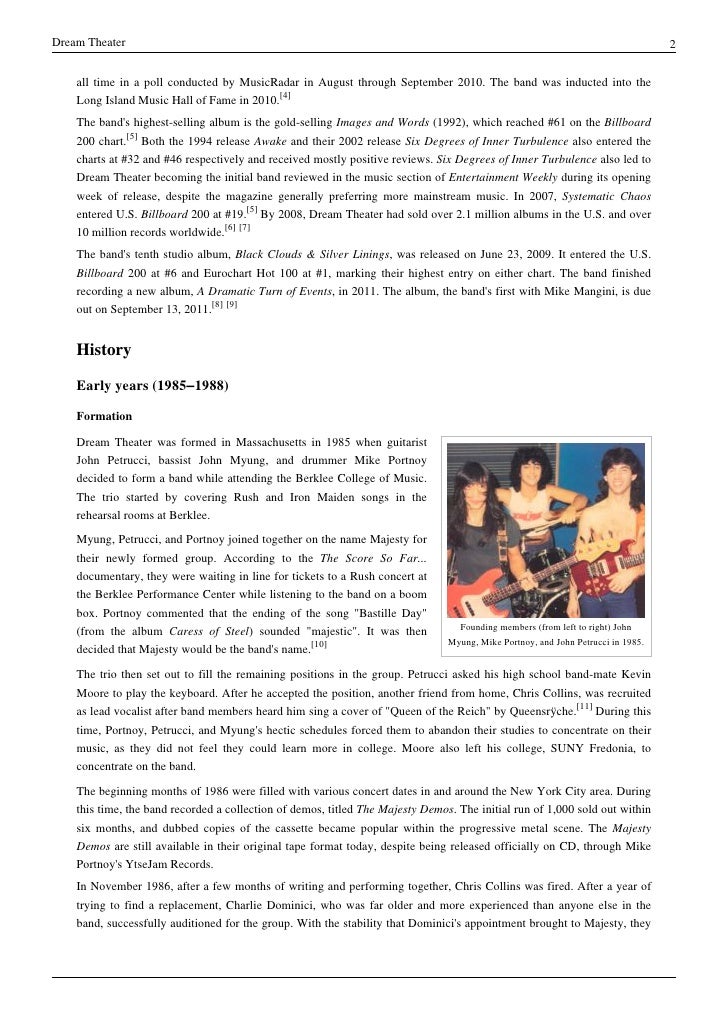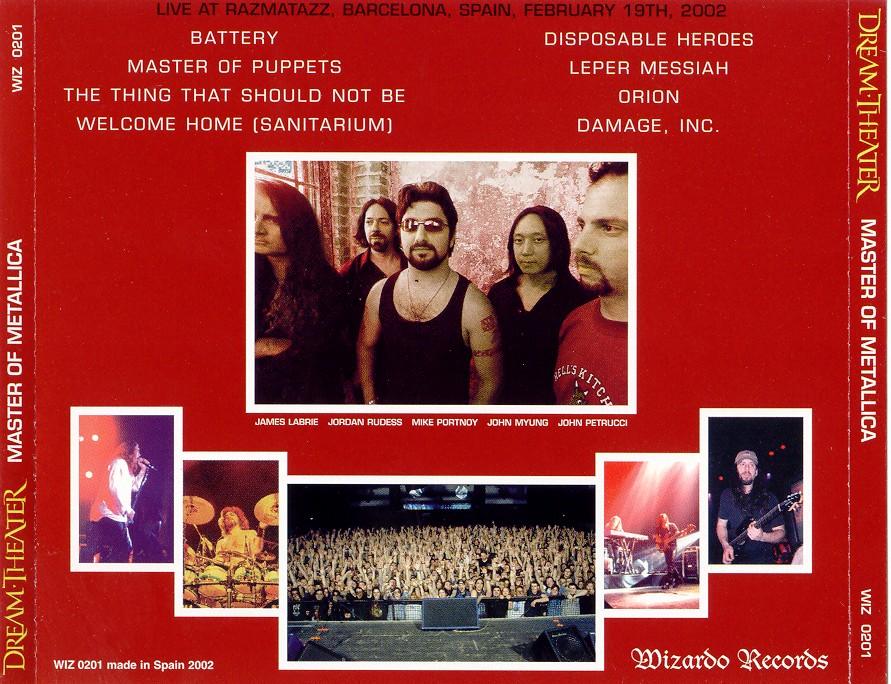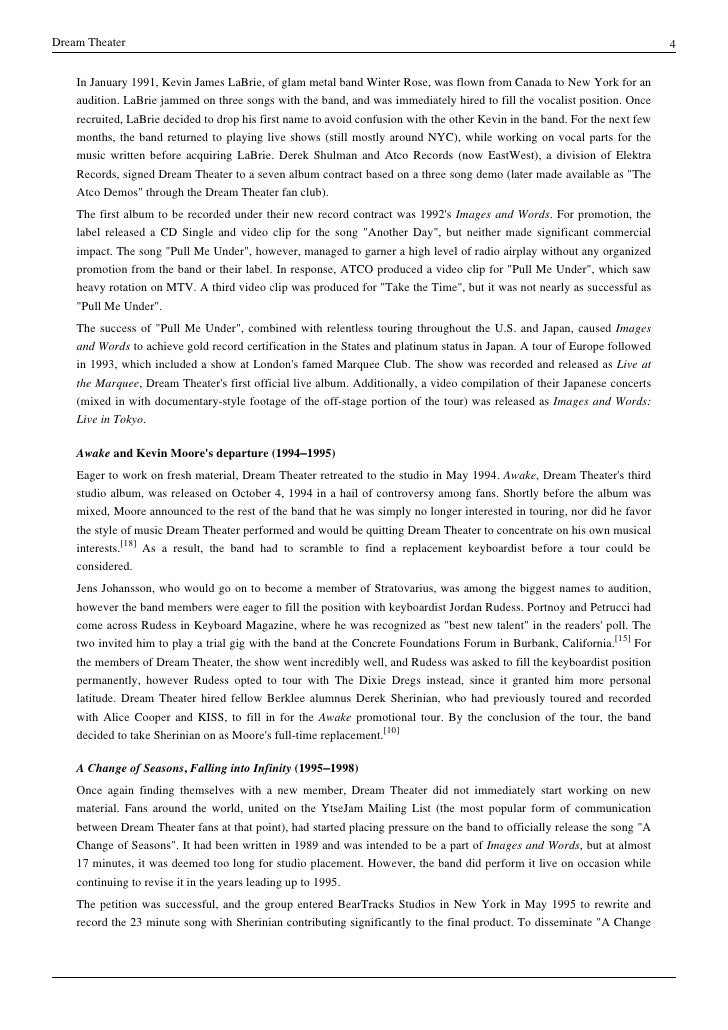Torrent Dream Theater Master Of Puppets Youtube
Loop sections of Dream Theater - Peruvian Skies with our loop control on YouTube for Musicians! Dec 13, 2009 Metallica - Master of Puppets Cover by Dream Theater. Metallica - Master of Puppets Cover by Dream Theater. We've been hard at work on the new YouTube.
Get Apple Music on iOS, Android, Mac and Windows
Albums
See AllVidéos
See AllArtist Playlists
See AllSingles & EPs
See AllLive Albums
See AllCompilations
See AllMovies
See AllBooks
See AllAbout Dream Theater
The Grammy-nominated Long Island-based quintet Dream Theater are, in the 21st century, the standard bearers of progressive metal. While the subgenre's origins can be traced to Rush's song 'Bastille Day' in 1975, and Queensrÿche's 1988 concept offering Operation: Mindcrime was its first full-length album, Dream Theater have largely defined and expanded the music's horizons since 1986. The band's ability to deliver tight, melodic, musically sophisticated songs and thematic concept recordings that encompass elements of hook-based hard rock, riff-fueled metal, syncopated prog, and sophisticated lyrics, have made them the act that subsequent genre bands aspire to and are measured by. While five of their albums have charted inside the Top 20 of the Top 200, ten have placed inside the top half of the chart. They have sold more than 12 million records globally. The recording that initially established their signature was their second, 1992's Images and Words, while 1994's Awake, 1999's Metropolis, Pt. 2: Scenes from a Memory, and 2002's Six Degrees of Inner Turbulence, cemented their place at the top of the metal heap. For 2016's The Astonishing -- a double-length dystopian sci-fi opera that reached the Top 20 on the albums chart -- they were accompanied by the Prague Symphony Orchestra and three choirs. Dream Theater is known for its high-energy concert performances. While they've released several live albums -- Live at the Marquee, recorded at the London club; Live in Japan, recorded during the Music in Progress tour in 1993; and Live Scenes from New York -- they remain one of heavy metal's most bootlegged bands.
Originally named Majesty (from a lyric in 'Bastille Day'), the band was founded by Berklee College of Music students guitarist John Petrucci, bassist John Myung, and drummer Mike Portnoy; the band soon expanded with the addition of keyboard player Kevin Moore and vocalist Chris Collins. Releasing an eight-tune demo, Majesty Demo, as Majesty, the group sold 1,000 copies within six months. The departure of Collins in late 1986 left Majesty without a vocalist, and after a long period of auditioning possible replacements, the group settled on Charlie Dominici in November 1987. Changing its name, the group agreed on 'Dream Theater,' inspired by a now-demolished California movie theater. Signing with Mechanic Records, the group began working on its first full-length album. Delays caused by label mismanagement limited the group to performing at small clubs and bars. Frustrated by its experiences with the label, Dream Theater finally severed its ties with Mechanic.
This was only one drastic change in the band's course of action. Firing Dominici, the group spent the next couple years searching for a vocalist. The search ended in late 1991 when a demo tape from Canadian vocalist James LaBrie, formerly of Winter Rose, arrived. After flying to New York to audition, LaBrie was invited to join the band. Signing with Atco Atlantic (which came to be known as East West), Dream Theater released its second album, Images & Words, in 1992. One of three videos based on songs from the album, 'Pull Me Under,' became an MTV hit. Although Theater showed considerable growth with their third studio album, Awake, recorded between May and July 1994, the group continued to be hampered by personnel changes. Before the album was mixed, keyboardist Moore left the group to focus on his solo career. Hired as a temporary replacement for the band's Waking Up the World tour, Derek Sherinian later became a permanent member. His first recording with Dream Theater was a 23-minute epic, 'A Change of Seasons,' written in 1989 and released in September 1995 on the album of the same name.
Following a mini tour, Fix for '96, the members of Dream Theater separated for several months and became involved with a variety of outside projects. Petrucci was the busiest. In addition to joining Portnoy and keyboard player Jordan Rudess in the Liquid Tension Experiment -- a group that included influential bassist/stick player Tony Levin -- Petrucci played guitar with Trent Gardner's Explorers Club and made a guest appearance on Shadow Gallery's Tyranny album. Myung and Sherinian collaborated with King's X vocalist Ty Tabor in the band Platypus. LaBrie worked with Mull Muzzler, a group formed with Matt Guillory and Mike Mangini.
Dream Theater experienced yet another change when Rudess was tapped to replace Sherinian, who had been fired in 1999. The band released the progressive rock-heavy Scenes from a Memory that year, a conceptual piece that followed the story of the 1928 murder of a young woman and how a modern man is haunted by the crime. It was followed by Live Scenes from New York in 2001, which suffered from an unintentional bout with controversy when its original cover featuring the city of New York in flames was pulled due to the events of September 11. The group continued in the progressive metal vein in 2002 with Six Degrees of Inner Turbulence, followed by the leaner Train of Thought in 2003 and Octavarium in 2005. The live album Score: XOX was released in 2006 and featured the band backed by a 29-piece orchestra. It was followed a year later by the new studio album Systematic Chaos, and in 2009 by Black Clouds & Silver Linings.
Sherinian went on to record as a soloist and to play with a prog and jazz fusion band, Planet X. Petrucci released an eponymously titled solo album in 2003, featuring accompaniment by Dave LaRue of the Dixie Dregs and Boston-based drummer Dave DiCenso. In late 2010, Mike Mangini joined the group, replacing drummer Mike Portnoy, who left the band in September of that year. With a rigorous touring schedule to firmly break in Mangini, Dream Theater somehow found time to record. They pre-released the track 'On the Backs of Angels' on YouTube via their label, Roadrunner, in June of 2011, followed by the CD release of the aptly titled full-length, A Dramatic Turn of Events, in the fall. After a period of rigorous international touring, the band took a break though its members continued writing. They reconvened in early 2013 and returned with a self-titled studio album in September -- this one with Mangini completely involved in the writing process -- followed in November with the concert recording Live at Luna Park on CD and DVD, which was recorded during the Dramatic Turn of Events tour over two nights at the Buenos Aires soccer stadium. Recorded live at the Boston Opera House on March 24, 2014, the concert recording Breaking the Fourth Wall arrived the following year, and in late 2015 the band announced their upcoming 13th studio album, The Astonishing. A completely conceptual sci-fi offering, it was released on January 29, 2016. After a world tour in which they performed the whole of the album, the band took an extended breather. At the end of 2018, Dream Theater released the single and video for 'Untethered Angel' in advance of a North American tour. The full-length Distance Over Time was the first album by the band to clock in at less than an hour in length in over a decade. Petrucci credited the more economical running time to a more collaborative writing process that took merely 18 days to complete, and focused on harder-edged songs than more recent recordings. Distance Over Time was released by Inside Out in early 2019. ~ Craig Harris
Similar Artists
See All* New subscribers only. Plan automatically renews after trial.
| 'Master of Puppets' | ||||
|---|---|---|---|---|
| Single by Metallica | ||||
| from the album Master of Puppets | ||||
| B-side | 'Welcome Home (Sanitarium)' (7') | |||
| Released | July 2, 1986 | |||
| Format | ||||
| Recorded | 1985 at Sweet Silence Studios (Copenhagen, Denmark) | |||
| Genre | Thrash metal | |||
| Length | 8:36 | |||
| Label |
| |||
| Songwriter(s) | ||||
| Producer(s) |
| |||
| Metallica singles chronology | ||||
| ||||
'Master of Puppets' is a song by American heavy metal band Metallica, released in July 2, 1986 as the only single from the band's 1986 studio album of the same name. It was also issued as a promo single in the US by Elektra Records.[1]
The song was recorded during October–December 1985 at Sweet Silence Studios in Copenhagen, Denmark.[2][3]
It is the second and title track of the album, preceded by a shorter, high-speed typical thrash metal track, 'Battery', a similar sequencing heard on Metallica's second (Ride the Lightning) and fourth (..And Justice for All) albums. 'Master of Puppets' is also notable for its extensive use of downpicking and long instrumental section, beginning at 3:34.
The song, as lead singer James Hetfield explained, 'deals pretty much with drugs. How things get switched around, instead of you controlling what you're taking and doing, it's drugs controlling you.'[4] The song was bassist Cliff Burton's favorite song on the album, as quoted when the album was released. The song is one of the band's most famous and popular songs, frequently played at concerts.
Master Of Puppets Full Album
- 4In popular culture
Live performances[edit]
The videos Cliff 'Em All and S&M include live performances of 'Master of Puppets' in its entirety. A shortened form appears in Cunning Stunts. Both versions can be seen in the video portions of the Live Shit: Binge & Purgebox set.
'Master of Puppets' is the band's most played song of all time, first played on December 31, 1985 at San Francisco's Bill Graham Civic Auditorium for a crowd of 7,000.[5] As of July 24, 2019, the song has been performed 1,662 times (the most recent being July 21, 2019 in Moscow, Russia, at Luzhniki Stadium).[6] During the band's World Magnetic Tour, additional live performances were filmed in Mexico City; Nîmes, France and Sofia, Bulgaria. These performances were released on video in November 2009 (Mexico and Nîmes) and October 2010 (Sofia).
From late 1999 through 2000, Metallica often combined the song with 'Welcome Home (Sanitarium)' in concert, calling it 'Mastertarium'.
Track listing[edit]

| French 7' single | ||
|---|---|---|
| No. | Title | Length |
| 1. | 'Master of Puppets' (7' Edit) | 3:27 |
| 2. | 'Welcome Home (Sanitarium)' | 4:06 |
Awards[edit]
VH1 ranked the song as the third greatest heavy metal song ever.[7]
In March 2005, Q magazine placed it at number 22 in its 100 Greatest Guitar Tracks list.[8]
Rise of nations gold edition patch italy map. Martin Popoff's book The Top 500 Heavy Metal Songs of All Time ranked the song at number 2. Popoff composed the book by requesting that metal fans, musicians, and journalists nominate their favorite heavy metal songs. The author derived the final rankings from a database tallying almost 18,000 votes.
The song also ranked number 1 on a 100 Greatest Riffs poll conducted by Total Guitar magazine.
The readers of Guitar World voted the song as ranking at number 51 among the 100 Greatest Guitar Solos. Lead guitarist Kirk Hammett's solos for 'Fade to Black' and 'One' ranked significantly higher on the same list.

In popular culture[edit]
Cover versions[edit]
'Master of Puppets' has been covered by multiple artists.
- Ugly Kid Joe covered the song for Metallic Attack: Metallica - The Ultimate Tribute
- Burden of Grief covered this song on the compilation A Tribute to the Four Horsemen.
- Pendulum performed a cover of this song during their United Kingdom and worldwide tours in 2008 and 2009. Their version was featured on the concert album Live at Brixton Academy.
- German a cappella metal band Van Canto covered the song on their third studio album Tribe of Force.

Media[edit]
Various parts of the song has also been used in various media:
Youtube Master Of Puppets Metallica
- It was featured in The Simpsons episode 'The Mook, the Chef, the Wife and Her Homer' in a scene where Hans Moleman drives away as Metallica is playing on the back of his truck.
- It was used as the trailer song and appears in Guitar Hero: Metallica, along with the songs 'Battery', 'The Thing That Should Not Be', 'Welcome Home (Sanitarium)', 'Disposable Heroes', and 'Orion' as playable tracks from the Master of Puppets album.
- It was used in Metal: A Headbanger's Journey.
See also[edit]
References[edit]
- ^'Metallica - Master Of Puppets'. Discogs.
- ^Gulla, Bob (2009). Guitar Gods: The 25 Players who Made Rock History. ABC-CLIO. p. 103. ISBN9780313358067.
- ^Brannigan, Paul; Winwood, Ian (2011). Birth School Metallica Death. 1. Da Capo Press. p. 195. ISBN9780306821868.
- ^Hetfield, James (1988). 'Interview with Metallica, from Vol. 6, No.8' (Interview). Interviewed by Pushead. Thrasher Magazine. Archived from the original on January 5, 2008. Retrieved 2008-01-30.Cite uses deprecated parameter
deadurl=(help) - ^Brannigan, Winwood 2011, pp. 199–200.
- ^'Metallica Concert Metallica Setlist at Luzhniki Stadium, Moscow, Russia on July 21, 2019 - setlist.fm'. setlist.fm.
- ^'VH1 40 Greatest Metal Songs'. VH1. Archived from the original on November 18, 2007. Retrieved 2008-01-30.Cite uses deprecated parameter
deadurl=(help) - ^'Rocklist.net..Q Magazine Lists.'